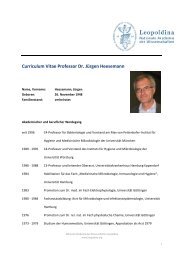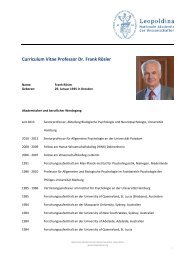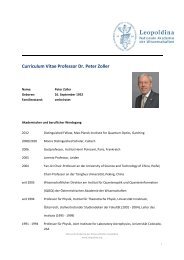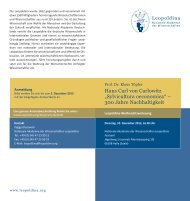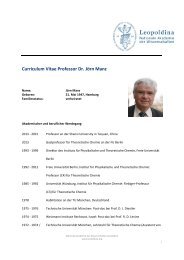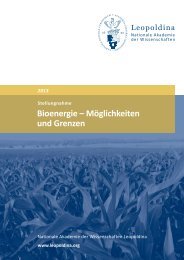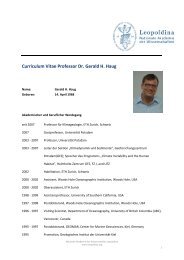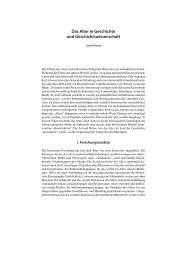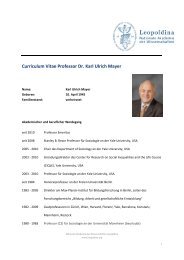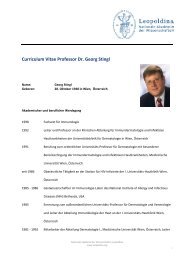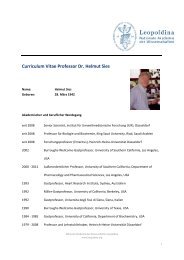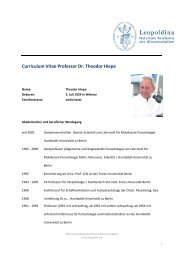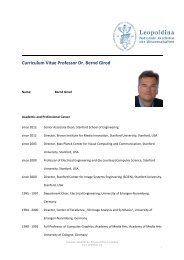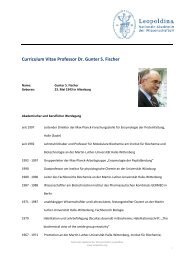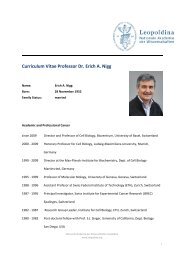Curriculum Vitae Professor Dr. Wolfgang Künzel - Leopoldina
Curriculum Vitae Professor Dr. Wolfgang Künzel - Leopoldina
Curriculum Vitae Professor Dr. Wolfgang Künzel - Leopoldina
You also want an ePaper? Increase the reach of your titles
YUMPU automatically turns print PDFs into web optimized ePapers that Google loves.
<strong>Curriculum</strong> <strong>Vitae</strong> <strong>Professor</strong> <strong>Dr</strong>. <strong>Wolfgang</strong> <strong>Künzel</strong><br />
Name: <strong>Wolfgang</strong> Kuenzel<br />
Born: 28 July 1936 Zwickau, Germany<br />
Family Status: married<br />
Academic and Professional Career<br />
since 2002 <strong>Professor</strong> Emeritus<br />
1980 - 2002 <strong>Professor</strong> and Chairman Frauenklinik, University Giessen, Department of Obstetrics<br />
and Gynecology, Germany<br />
1976 - 1979 Specialist training in Obstetrics and Gynecology, University Hospital Würzburg, Germany<br />
1973 - 1974 Acting Chairman, Dept. Obstetrics and Perinatology, Medical School Hannover,<br />
Germany<br />
1975 / 76 Associate <strong>Professor</strong><br />
1972 Trustee of the Hannover Medical School, Germany<br />
1971 - 1972 Specialist training in Obstetrics and Gynecology, Hannover Medical School, Germany<br />
1970 Habilitation, Gynecology and Obstetrics, Hannover Medical School, Germany<br />
1963 Approbation<br />
1962 - 1968 Specialist training in Obstetrics and Gynecology, University Hospital Kiel, Germany<br />
1962 Ph.D., University Kiel, Germany<br />
Nationale Akademie der Wissenschaften <strong>Leopoldina</strong><br />
www.leopoldina.org<br />
1
1960 Medical Examination<br />
1954 - 1956 Studies, Philipps University Marburg, Germany<br />
1957 - 1960 Studies, University Kiel, Germany<br />
Project coordination, Membership in collaborative research projects (Selection)<br />
1974 / 75 Research Grant German Research Foundation (DFG): Cerebral blood flow,<br />
umbilical blood flow and fetal oxygenation. University of New York at Stony Brook<br />
1968 / 70 Institute of Physiology Medical School Hannover: Uterine blood flow and Fetal<br />
Oxygenation (DFG Grant)<br />
Functions in Scientific Societies and Committees (Selection)<br />
2002 - 2004 Member of the Management Committee of The European Congress<br />
2002 - 2003 Member of the Expert Committee, Medical Chamber Hessen, Germany<br />
1999 - 2002 President of the European Board and College of Obstetrics and Gynaecology<br />
1997 - 2004 Secretary General of EAGO<br />
1996 - 1997 Member of the Finance Committee of the FIGO<br />
1996 - 1997 Member of the Executive Committee of EAGO<br />
1996 - 1997 Member Executive Committee of the European Board and College of Obstetrics and Gynaecology<br />
1992 - 1996 Member of the Scientific Committee of the European Society of Perinatal Medicine<br />
1992 - 1996 Member Scientific Committee of the European Association of Obstetrics and Gynaecology (EAGO)<br />
1992 - 1994 President elect of the German Society of Gynecology and Obstetrics<br />
1991 - 2004 Member of the Committee Training and assessment German Academic Society of Obstetrics and<br />
Gynaecology and Representative for Europe<br />
1991 - 1996 Treasurer of the European College of Obstetrics and Gynaecology<br />
1991 - 1997 Chairman Standing FIGO Committee on Perinatal Health<br />
Nationale Akademie der Wissenschaften <strong>Leopoldina</strong><br />
www.leopoldina.org<br />
2
1989 - 1991 Vice-Dean of the Department of Human Medicine at the University Gießen , Germany<br />
1985 - 2010 Member of the Committee of Training and Assessment, Medical Chamber Hessen, Germany<br />
1984 - 1996 President of the German Society of Gynecology and Obstetrics<br />
1984 - 1992 Treasurer of the German Society of Gynecology and Obstetrics<br />
Honours and Awarded Memberships (Selection)<br />
2009 Honorary Member of the German Society of Perinatal Medicine<br />
2008 Honorary Member Academic Society of Gynecology and Obstetrics, Germany<br />
2004 Honorary Fellow of the European Board and College of Obstetrics and Gynaecology<br />
2001 Member honoris causa Hungarian Society of Obstetrics and Gynecology<br />
2001 Certificate of Appreciation by the University of Assiut, Egypt<br />
1997 Member of the German Academy of Sciences <strong>Leopoldina</strong><br />
1999 Otto Käser Memorial Lecture, Basel, Switzerland<br />
1996 <strong>Dr</strong>. Richard Hammer Medal, Medical Chamber Hessen, Germany<br />
1995 Fellow ad eundem of the Royal College of Obstetricians and Gynaecologists<br />
Nationale Akademie der Wissenschaften <strong>Leopoldina</strong><br />
www.leopoldina.org<br />
3
Major Scientific Interests<br />
The research interest is focused on in utero fetal development and its supervision during<br />
pregnancy and labor. First investigations were conducted in the 60 th looking at fetal<br />
oxygenation during labor by fetal blood sampling in cooperation with KH Wulf at the dept.<br />
ob/gyn university in Kiel. There is no combined metabolic and respiratory acidosis at the start<br />
of labor in the normal fetus, but it develops during intense uterine contractions as a result of<br />
a repeated reduced uterine blood flow. Animal experiments on guinea pigs and sheep in the<br />
70 th made clear that fetal oxygen consumption (VO2) is dependent on uterine blood flow<br />
(UBF) in a nonlinear relationship, i.e. at high blood flow rates changes of UBF are not<br />
accompanied by a reduction of oxygen consumption. VO2 fell however if a critical level of SO2<br />
(%) of 30% or UBF of 50-70 ml/kg/ min are undercut. In shock situations in the pregnant sheep<br />
uterine blood flow is reduced as a result of the high resistance in the uterine circulation.<br />
Cerebral function measured by fetal EEG measured in cooperation with Leon Mann at SUNY in<br />
1975 is strongly related to the sufficient oxygen supply to the uterus and the fetus.<br />
The fetal condition in utero is best estimated by its heart rate during pregnancy and labor.<br />
Reduction of UBF leads to a fall of FHR, depending on the condition of the fetus and the<br />
amount of UBF reduction. It is however difficult to estimate fetal condition solely by a single<br />
parameter of fetal heart rate, since FHR shows a typical pattern during fetal deterioration.<br />
Major parameters of fetal heart rate have to be observed and valued simultaneously: Base<br />
line FHR, Oscillations in amplitude and frequency, decelerations of FHR (not classified in late,<br />
variable and early) and the number of decelerations especially during last stage of labor.<br />
Research interest is since 2005 directed to MMR and FMR in a low income country Nigeria<br />
with a high maternal and neonatal mortality. The introduction of quality assurance in<br />
obstetric s in 20 selected hospitals led in 2011 to a reduction of MMR by 60% and FMR by<br />
15%<br />
Nationale Akademie der Wissenschaften <strong>Leopoldina</strong><br />
www.leopoldina.org<br />
4



